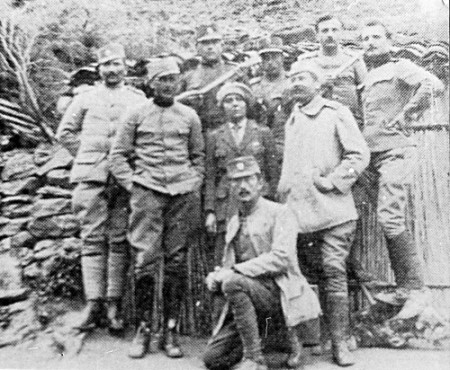
Dragoljub Draža Mihailović was a commander of the Yugoslav Army in the Homeland, also known as the Chetnik movement, during World War II. In 1946, he was captured by the communist Yugoslav authorities, convicted of high treason and war crimes, sentenced to death and executed.
The tribunal for his rehabilitation, which began in June 2010 on the request by Draža’s grandson Vojislav Mihailović, is nearing the end now. Although the request has been supported by some academicians, professors and politicians, the public in Serbia is divided. For some, Draža Mihailović is an innocent victim, for others, he is a justly convicted collaborator of the occupiers, who committed crimes not only in Serbia, but in Bosnia and Herzegovina and Croatia as well.
Some politicians, NGOs and citizens from these countries have also reacted to the news. They have a more or less unified view of Draža Mihailović, considering him a criminal and a nationalist who had the idea to establish the so-called Greater Serbia.
Ivo Josipović, the President of Croatia, said to the Croatian daily Jutarnji List:
“Draža Mihailović was a war criminal… I could remember a lot of cases where [Chetniks] collaborated, not being anti-fascists, but collaborated with the Germans, Italians and [Ustaše] fighting against the [partisans]… If the trial is finished as the media are announcing – but wait for the end of it – it will be a bad step in regard to the Second World War and anti-fascism.”
The Movement of War Victims from Bosnia issued a statement, in which they said this, among other things:
“Bosnia and Herzegovina paid dearly for the Greater Serbia ideology, one of whose trademarks Draža Mihailović is. On the occasion of his rehabilitation we are seriously worried about sovereignty and peace in our country and we are afraid because we don’t know whether the atrocities and deaths which we experienced 20 years ago are behind us forever. Equaling the fascist and anti-fascist movements is the same as equaling victims and criminals from the period of aggression on our country.”
However, Vuk Jeremić, Serbia’s minister of foreign affairs, thinks the rehabilitation of Draža Mihailović is an internal issue of Serbia.
Serbian blogger Filip Mladenović wrote in his post:
“[…] However, I am particularly irritated with the revision of history. It’s not clear to me who is in favor of relativizing our ancestors’ anti-fascist fight during the Second World War now by attempting to rehabilitate the Ravnogorski movement and its leader Draža Mihailović. Why does Serbia throw itself out of the winning anti-fascist coalition by these auto-goals? Why does it disown so many victims who perished honorably and courageously during the fight against Hitler’s Nazi regime? […]”
There are more than 350 comments on Mladenović’s post. Below are some of them.
Johnnyt wrote:
“You are spitting at the man who was a genuine fighter against fascists and communists, while criminal [Tito], the president of the genocidal country of SFR Yugoslavia, is loafing in the House of Flowers […]”
Dextera said:
“Filip, you don’t know a lot of things. You have exclusively read and cited official history created by Tito’s regime. You don’t know that the trial of Draža Mihailović was a fixed [political] trial, you don’t know what kind of documents there are, you don’t know the role of the [Comintern], you don’t know who Dragić Joksimović was, you don’t know that Draža’s sister was killed by the Soviet soldiers when they entered Belgrade in 1944, etc. You would like to make things to be black and white, just the way Tito was doing.”
Cult said:
“It has to banned by law to falsify history and rehabilitate national traitors and collaborators with the occupiers.”
niccolo said:
“It’s futile to discuss again who killed more civilians – the Chetniks or the Partisans. However, does any of the participants in the discussion realize that the procedure of rehabilitation is not related to the question of whether someone committed a crime or not, but to the question of whether the accused one had a fair trial or had no trial at all?”
A Belgrade-based historian Ljubinka Trgovčević said this to the Slobodna Evropa (Free Europe) web site:
“If it was only about the reconstruction of the court trial, then the problem would be much less anyway. In this way, it goes without saying that he was acquitted, as well as his movement, of everything that he did or did not do.”
Mirko Kovač, a well-known novelist from Croatia, said this to the same source:
“Super. People could hardly wait for it to be done, so they could rehabilitate their own ones. This region is the same as Serbia. People here dream of rehabilitating [Ante Pavelić].”
Dušan Stefanović from Chicago left this comment to the Slobodna Evropa article:
“I don’t see who was betrayed by Draža in the war. He was fighting against Tito’s communists, Pavelić’s soldiers [the Ustaše], Hitler’s fascists… all enemies of the Serbian people during the war. He saved thousands of American pilots, more than 500 of them were evacuated only from the village of Pranjani in 1943. De Gaulle and Truman decorated him with the highest medals for his role in the war. Above all, General Mihailović did not betray Serbia.”
This is a cross post from Global Voices.
For further information on the topic, check out the following articles:
Politics to Politicians – History to Historians

